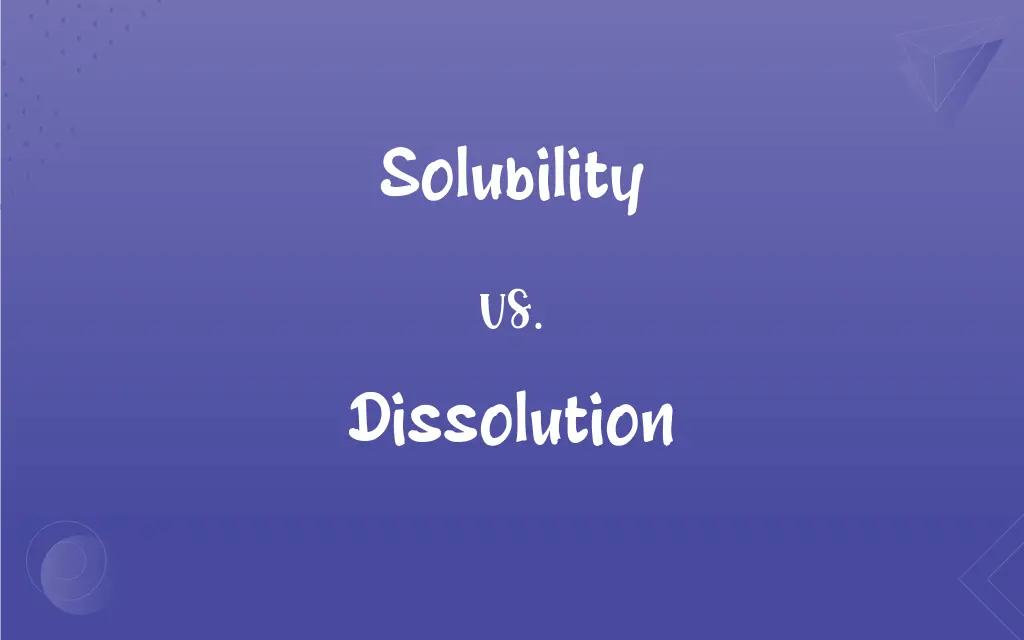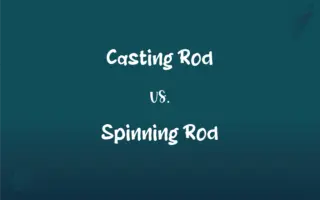Solubility vs. Dissolution: What's the Difference?
Edited by Aimie Carlson || By Janet White || Published on January 20, 2024
Solubility is the ability of a substance to dissolve in a solvent; dissolution is the process of a substance dissolving in a solvent.

Key Differences
Solubility refers to the maximum amount of a substance that can dissolve in a given amount of solvent at a specific temperature. Dissolution is the process by which this substance actually dissolves in the solvent.
Solubility is a property of a substance and is often quantified as grams per liter. Dissolution, on the other hand, describes the action or process of a substance becoming solvated.
Factors affecting solubility include temperature, pressure, and the nature of the solute and solvent. The rate of dissolution can be influenced by stirring, particle size, and temperature.
Solubility is a static measure, indicating how much solute can be dissolved. Dissolution is a dynamic process, involving interactions between solute and solvent molecules.
In chemical terms, solubility determines how substances interact in a solution. Dissolution is a key step in the process of a substance integrating into a solution.
ADVERTISEMENT
Comparison Chart
Definition
Ability to dissolve in a solvent
Process of dissolving in a solvent
Nature
Property of a substance
Action or process
Measurement
Quantified as concentration
Described by rate and mechanism
Influencing Factors
Temperature, pressure, solute, and solvent
Stirring, particle size, temperature
Role in Chemistry
Determines potential extent of dissolution
Actual process of solute becoming solvated
ADVERTISEMENT
Solubility and Dissolution Definitions
Solubility
The maximum amount a substance can dissolve.
The solubility of salt in water decreases with temperature.
Dissolution
Breaking down of substances into ions or molecules.
Tablet dissolution in water is crucial for medication absorption.
Solubility
Measured as concentration under specific conditions.
Sugar’s solubility in water is high, allowing for sweet solutions.
Dissolution
Integral in forming solutions.
The dissolution of oxygen in water is vital for aquatic life.
Solubility
Influenced by pressure and temperature.
Carbon dioxide's solubility in water is utilized in carbonated drinks.
Dissolution
Involves physical and chemical changes.
Salt undergoes dissolution when mixed with water, forming a saline solution.
Solubility
Property defining how well a substance dissolves.
Oil's low solubility in water leads to separation.
Dissolution
The process of a solute dissolving in a solvent.
The dissolution of sugar in tea involves breaking sugar molecules apart.
Solubility
Depends on molecular interactions.
The solubility of gases in liquids often decreases with rising temperature.
Dissolution
Can be accelerated by stirring or heating.
Faster dissolution of detergent in hot water improves cleaning.
Dissolution
Decomposition into fragments or parts; disintegration.
Dissolution
Indulgence in sensual pleasures; debauchery.
FAQs
How does temperature affect dissolution?
Temperature can increase the rate of dissolution for most solids in liquids.
What is solubility in chemistry?
Solubility in chemistry is the ability of a substance to dissolve in a solvent to form a homogeneous solution.
Is solubility a constant value?
Solubility can vary with different conditions like temperature and pressure, but it's a specific value under given conditions.
Can dissolution be a chemical change?
Yes, when bonds are broken and new ones are formed, dissolution involves a chemical change.
Can solubility be increased?
Yes, often by changing the temperature or pressure, or by altering the chemical nature of the solvent.
What factors influence the rate of dissolution?
Factors include stirring, surface area of the solute, temperature, and the nature of the solvent and solute.
How do pressure changes affect gas solubility?
Increased pressure usually increases the solubility of gases in liquids.
What's the difference between solubility and solvation?
Solubility is the capacity to dissolve, while solvation is the process of surrounding solute particles with solvent molecules.
Can all liquids dissolve solids?
No, the ability to dissolve solids depends on the chemical nature of both the liquid and the solid.
Are solubility and concentration the same?
No, solubility is the maximum amount that can dissolve, while concentration is the actual amount of solute in a solution.
Can dissolution be reversed?
In some cases, like evaporating the solvent, dissolution can be reversed.
What is an example of dissolution in daily life?
Dissolving sugar in coffee or tea is a common example of dissolution.
Is it possible for something to be insoluble?
Yes, some substances do not dissolve in a particular solvent and are considered insoluble.
What is an unsaturated solution?
An unsaturated solution contains less solute than the maximum amount that can be dissolved.
Does pH affect solubility?
Yes, pH can affect the solubility of certain substances, especially those that are weak acids or bases.
What role does dissolution play in medication?
Dissolution is crucial for medication absorption in the body from oral tablets or capsules.
What is a saturated solution?
A saturated solution occurs when no more solute can dissolve at a given temperature and pressure.
How is solubility used in industries?
Solubility is important in pharmaceutical, food, and chemical industries for product formulation.
Does stirring always speed up dissolution?
Stirring usually speeds up dissolution by moving dissolved particles away from the solute surface.
Is solubility important in environmental science?
Yes, solubility influences the distribution and bioavailability of chemicals in the environment.
About Author
Written by
Janet WhiteJanet White has been an esteemed writer and blogger for Difference Wiki. Holding a Master's degree in Science and Medical Journalism from the prestigious Boston University, she has consistently demonstrated her expertise and passion for her field. When she's not immersed in her work, Janet relishes her time exercising, delving into a good book, and cherishing moments with friends and family.
Edited by
Aimie CarlsonAimie Carlson, holding a master's degree in English literature, is a fervent English language enthusiast. She lends her writing talents to Difference Wiki, a prominent website that specializes in comparisons, offering readers insightful analyses that both captivate and inform.






































































